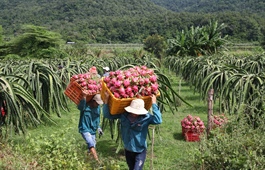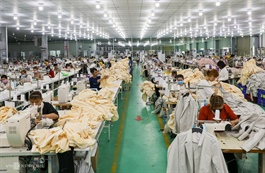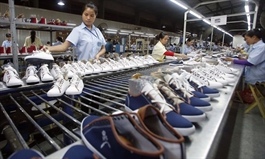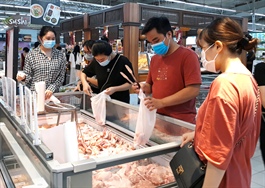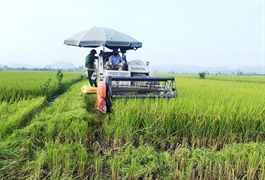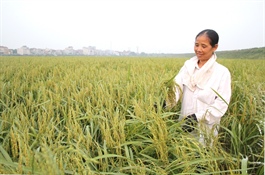HCMC F&B firms brace for reopening challenges
HCMC F&B firms brace for reopening challenges
As they consider reopening after pandemic related suspensions, HCMC food and beverage companies face several challenges including higher raw material prices and lower demand.
A staff of Dau Homemade prepares food in early 2021. Photo courtesy of Dau Homemade
|
Tran Le Anh Tuyet, owner of online vegetarian restaurant Yukikitchen, is wondering what the demand for vegetarian food would be after the economy reopens.
She lives in Cu Chi District, which has been chosen with District 7 to trial a "new normal" scheme: gradually reopening economic activities with safety measures imposed.
"I think reopening is needed for economic recovery even though it’s a bit late."
But she is unsure whether choosing the suburban district of Cu Chi to try it out is most effective.
Lagom Group, which operates coffee and beer chain Lagom Cafe, is reluctant about a premature reopening.
The company has seen "severe" impacts on its financial reports in the second and third quarter, group CEO Do Thi Ly Na said.
But the company is willing to hold on as long as possible for authorities to better contain the virus, she said, adding that only when all Covid-19 patients have been identified in the community should the economy be restarted.
Many other F&B companies in Ho Chi Minh City are experiencing headaches regarding reopening their businesses in the city after two-month hibernation exhausted their resources and resilience.
HCMC mobility fell nearly 90 percent year-on-year in August, leading to a 51 percent slash in retail sales, according to a recent report by lender HSBC.
"August data speaks for itself in revealing the pain Vietnam’s economy is facing. The impact is much more severe than that during the three-week national lockdown in April 2020," it added.
This is why F&B chains are conscientious about how and when to reopen to ensure the best recovery.
Tofu chain Dau Homemade is waiting for more specific guidelines from authorities to reopen its eight outlets and a breakfast stall.
"Reopening all of them at once would be difficult. Many of our staff have returned to their hometowns and cannot return immediately," said a spokesperson, adding demand is set to be low at first.
The costs of Covid-19 testing have eaten into the company’s revenues in the last three months, while its suppliers struggle to source ingredients due to rising costs.
It would take a long time for the chain to return to its pre-pandemic level, the spokesperson said.
The Vagabond bakery and cafe faces the same difficulties in sourcing ingredients as there are limited choices amid mobility restrictions.
"We often used high quality French butter, and so if we switch to lower quality butter now while pushing up prices, we might lose our reputation," said founder and CEO Nguyen Hoang Viet.
Japanese style restaurant chain Morico is facing a cash shortage after a long time of social distancing.
The chain, which relies mostly on brick and mortar sales, is set to face difficulties in reopening if the number of customers are limited, said Marketing Director Nguyen Van Thanh.
She said a discount in utility bills would help businesses reopen, she said.
Na of Lagom Group proposed restrictions in mobility should still be imposed to ensure no contagion, and that travel histories should be monitored using apps.
She also wants tax breaks in upcoming years to give businesses more time to recover.
Many F&B chains in HCMC remain closed as of Monday. Phuc Long Tea and Koi beverage chain has announced they would reopen soon without giving a specific date.
Some restaurant chains have begun selling fresh food online should authorities give the green light on Sept. 16.
HCMC has recorded more than 303,000 Covid-19 cases since the end of April, including over 4,400 on Monday.




